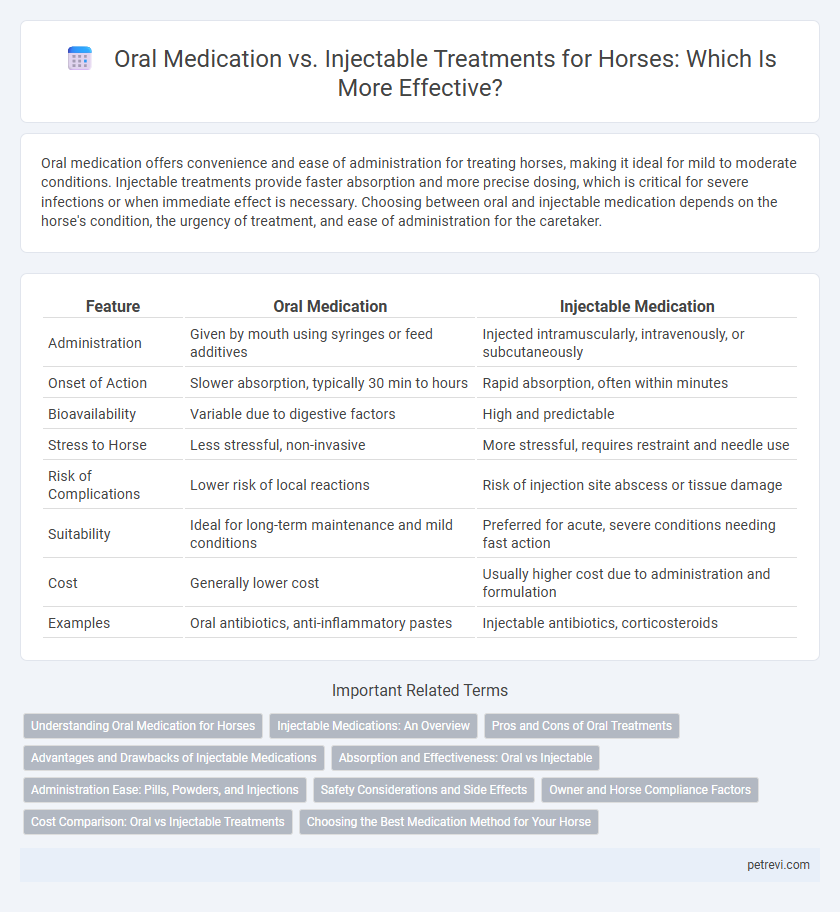Oral medication offers convenience and ease of administration for treating horses, making it ideal for mild to moderate conditions. Injectable treatments provide faster absorption and more precise dosing, which is critical for severe infections or when immediate effect is necessary. Choosing between oral and injectable medication depends on the horse's condition, the urgency of treatment, and ease of administration for the caretaker.
Table of Comparison
| Feature | Oral Medication | Injectable Medication |
|---|---|---|
| Administration | Given by mouth using syringes or feed additives | Injected intramuscularly, intravenously, or subcutaneously |
| Onset of Action | Slower absorption, typically 30 min to hours | Rapid absorption, often within minutes |
| Bioavailability | Variable due to digestive factors | High and predictable |
| Stress to Horse | Less stressful, non-invasive | More stressful, requires restraint and needle use |
| Risk of Complications | Lower risk of local reactions | Risk of injection site abscess or tissue damage |
| Suitability | Ideal for long-term maintenance and mild conditions | Preferred for acute, severe conditions needing fast action |
| Cost | Generally lower cost | Usually higher cost due to administration and formulation |
| Examples | Oral antibiotics, anti-inflammatory pastes | Injectable antibiotics, corticosteroids |
Understanding Oral Medication for Horses
Oral medication for horses offers a non-invasive and convenient method for administering treatments such as dewormers, pain relievers, and antibiotics, with options including powders, pellets, and liquids. This route depends heavily on proper dosing, absorption through the gastrointestinal tract, and the horse's willingness to ingest the medication, impacting efficacy. Understanding factors like bioavailability, potential for slower onset compared to injectables, and the risk of spitting out doses helps optimize treatment outcomes and improve compliance in equine care.
Injectable Medications: An Overview
Injectable medications for horses offer rapid absorption and targeted delivery, making them ideal for acute conditions and emergency treatments. These medications bypass the digestive system, ensuring higher bioavailability and more predictable therapeutic effects compared to oral administration. Common injectable drugs include antibiotics, anti-inflammatories, and vaccines, which require precise dosing and sterile techniques to prevent complications.
Pros and Cons of Oral Treatments
Oral medication for horse treatment offers ease of administration and reduced stress compared to injections, making it suitable for routine care and long-term therapies. However, absorption variability and potential for reduced bioavailability can limit effectiveness, especially in cases requiring rapid onset or precise dosing. Oral treatments may also be less reliable due to factors like feed interactions and gastrointestinal conditions that affect drug absorption.
Advantages and Drawbacks of Injectable Medications
Injectable medications for horse treatment offer rapid absorption and precise dosing, making them ideal for urgent conditions or when oral administration is not feasible. However, they carry risks such as injection site reactions, potential tissue damage, and the need for skilled administration to avoid complications. These drawbacks highlight the importance of veterinary supervision and proper technique to ensure safety and efficacy in equine care.
Absorption and Effectiveness: Oral vs Injectable
Injectable medications in horses offer faster absorption and higher bioavailability compared to oral forms, ensuring prompt therapeutic effects especially during acute conditions. Oral medications undergo first-pass metabolism, resulting in variable absorption rates influenced by gastrointestinal factors, which can delay onset and reduce efficacy. Selecting injectable treatment enhances precision in dosing and rapid action, critical for managing severe equine illnesses effectively.
Administration Ease: Pills, Powders, and Injections
Oral medications for horses, including pills and powders, offer ease of administration by allowing owners to mix doses with feed or provide them directly, reducing stress and handling time. Injectable treatments, while often faster-acting and more potent, require precise technique and restraint to ensure safety and efficacy, which can be challenging without veterinary expertise. Choosing between oral and injectable options depends on the horse's temperament, the condition being treated, and the owner's experience in administering medications.
Safety Considerations and Side Effects
Oral medication for horses generally offers ease of administration and reduced risk of injection site reactions, but it may cause gastrointestinal upset such as colic or diarrhea if improperly dosed. Injectable treatments provide rapid absorption and targeted delivery, yet carry risks including tissue irritation, abscess formation, and potential for accidental nerve damage. Safe administration protocols and veterinary supervision are essential to minimize adverse effects and ensure effective equine health management.
Owner and Horse Compliance Factors
Oral medication for horses often improves owner compliance due to ease of administration and reduced stress on the animal, promoting consistent treatment adherence. Injectable treatments, while sometimes more effective for rapid absorption, can cause discomfort and require skilled handling, potentially impacting horse compliance negatively. Balancing the choice between oral and injectable forms depends on the horse's temperament and the owner's ability to maintain a treatment routine effectively.
Cost Comparison: Oral vs Injectable Treatments
Oral medication for horse treatment generally offers a lower upfront cost compared to injectable options, making it more accessible for routine care. Injectable treatments often require veterinary administration, increasing total expenses due to professional fees and sterile equipment. While injectables may provide faster and more effective results in certain conditions, the higher costs can impact long-term treatment budgeting for horse owners.
Choosing the Best Medication Method for Your Horse
Selecting the appropriate medication method for your horse depends on factors such as the type of illness, absorption rate, and ease of administration. Oral medications offer convenience and reduced stress but may have slower absorption and reduced bioavailability compared to injectable treatments. Injectable medications provide rapid and precise dosing, essential for acute conditions or when gastrointestinal absorption is compromised.
Oral Medication vs Injectable for Horse Treatment Infographic

 petrevi.com
petrevi.com